It’s almost as if Tsuki ga Kirei is trying to make up for every shortcoming in anime over the past decade all by its lonesome.
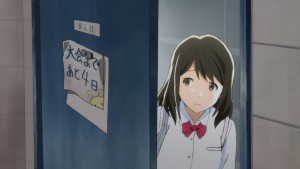 There’s so much I want to say after an episode like that one, which pretty much checked every box as far as I’m concerned. It feels to me like it should be self-evident to every viewer (though clearly it isn’t) that this series is exceptionally good, and exceptionally refreshing. But one wants to focus on all the things a series does right, to call attention to them even when it probably isn’t necessary to do so. That’s the nature of this aniblogging thing – it’s a lot more enjoyable to write about shows that are great that those that just pretty good, but you run the risk of being superfluous (though maybe you do that anyway – it’s not like we’re changing the world or anything).
There’s so much I want to say after an episode like that one, which pretty much checked every box as far as I’m concerned. It feels to me like it should be self-evident to every viewer (though clearly it isn’t) that this series is exceptionally good, and exceptionally refreshing. But one wants to focus on all the things a series does right, to call attention to them even when it probably isn’t necessary to do so. That’s the nature of this aniblogging thing – it’s a lot more enjoyable to write about shows that are great that those that just pretty good, but you run the risk of being superfluous (though maybe you do that anyway – it’s not like we’re changing the world or anything).
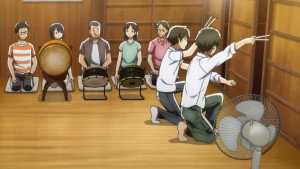 In a certain sense, Tsuki ga Kirei is like a thumb in the eye from Kishi Seiji to every salty complainer who said he couldn’t do restrained, sophisticated material (or that he just generally sucked). I’m sure Kishi-sensei doesn’t care, as he’s very successful in the industry (though hardly wealthy, given how little TV anime directors make), but that element of vindication is very much in my perception. It also seems as if Kishi and Kakihara Yuuko have been compiling a list of everything anime has been doing wrong – or not doing at all – in its treatment of adolescent drama and checking items off one by one as they obliterate them. Again, I’m sure they’re not – they have better things to worry about – but as this is an original series, you do wonder if there’s a conscious attempt to do something that cuts against the grain of industry trends in recent years.
In a certain sense, Tsuki ga Kirei is like a thumb in the eye from Kishi Seiji to every salty complainer who said he couldn’t do restrained, sophisticated material (or that he just generally sucked). I’m sure Kishi-sensei doesn’t care, as he’s very successful in the industry (though hardly wealthy, given how little TV anime directors make), but that element of vindication is very much in my perception. It also seems as if Kishi and Kakihara Yuuko have been compiling a list of everything anime has been doing wrong – or not doing at all – in its treatment of adolescent drama and checking items off one by one as they obliterate them. Again, I’m sure they’re not – they have better things to worry about – but as this is an original series, you do wonder if there’s a conscious attempt to do something that cuts against the grain of industry trends in recent years.
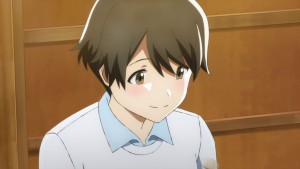 It’s probably not a bad thing that we have both a man and a woman creatively in charge of this series, because it does a remarkable job both of balancing the perspectives of its protagonists and delivering authenticity when it comes to those perspectives. Without question this is a series about more than simply Akane and Kotarou’s first love – it’s about the entire experience of being fourteen. That means trying to figure out what you want to do with your life, and having dreams that you’re too innocent to realize might not be practical. And thank goodness, too, because impractical dreams occasionally do come true.
It’s probably not a bad thing that we have both a man and a woman creatively in charge of this series, because it does a remarkable job both of balancing the perspectives of its protagonists and delivering authenticity when it comes to those perspectives. Without question this is a series about more than simply Akane and Kotarou’s first love – it’s about the entire experience of being fourteen. That means trying to figure out what you want to do with your life, and having dreams that you’re too innocent to realize might not be practical. And thank goodness, too, because impractical dreams occasionally do come true.
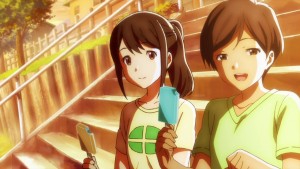 It strikes me in watching this ep that the influence of adults in the lives of kids this age is so unutterably profound, above and beyond even the obvious ways. Poor Kotarou is sandwiched between adults who want to crush his dream of being a writer – the idiot editor at “Kadoyama” publishing, first of all. He calls Kotarou into a meeting (talk about getting your hopes up) only to tell him “you should give up being a serious writer – you don’t have the talent for it” and encouraging him to write crap light novels. Then there’s his tiger mom, furious that he should be wasting time meeting with an editor because “no good can come of writing!” I was so infuriated to hear that, and by both these two generally – and believe me, there are plenty of adults who say similar things to adolescents in real life (I know some of them). Growing up shouldn’t be a process of having your dreams crushed out of you, but for many parents and “mentors”, that’s how they see it.
It strikes me in watching this ep that the influence of adults in the lives of kids this age is so unutterably profound, above and beyond even the obvious ways. Poor Kotarou is sandwiched between adults who want to crush his dream of being a writer – the idiot editor at “Kadoyama” publishing, first of all. He calls Kotarou into a meeting (talk about getting your hopes up) only to tell him “you should give up being a serious writer – you don’t have the talent for it” and encouraging him to write crap light novels. Then there’s his tiger mom, furious that he should be wasting time meeting with an editor because “no good can come of writing!” I was so infuriated to hear that, and by both these two generally – and believe me, there are plenty of adults who say similar things to adolescents in real life (I know some of them). Growing up shouldn’t be a process of having your dreams crushed out of you, but for many parents and “mentors”, that’s how they see it.
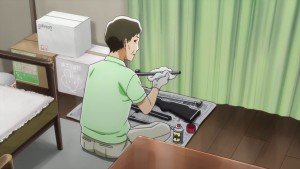 Meanwhile, Akane is having a rough time of it herself. Her big meet is coming up and she’s understandably distracted. Kotarou can’t be there to watch because of his meeting – though Akane clearly understands, and even pinky swears with him that both of them should do their best. A bigger problem is Chinatsu’s text, which is clearly weighing on Akane’s mind. I don’t think Chinatsu intended it that way but the timing could hardly have been worse, because Akane is not the sort of girl to toss aside her best friend over a guy – not casually, anyway (though Onee-san urges her to). Akane flops at the meet – not advancing, and even posting a slower time then she did as a 13 year-old.
Meanwhile, Akane is having a rough time of it herself. Her big meet is coming up and she’s understandably distracted. Kotarou can’t be there to watch because of his meeting – though Akane clearly understands, and even pinky swears with him that both of them should do their best. A bigger problem is Chinatsu’s text, which is clearly weighing on Akane’s mind. I don’t think Chinatsu intended it that way but the timing could hardly have been worse, because Akane is not the sort of girl to toss aside her best friend over a guy – not casually, anyway (though Onee-san urges her to). Akane flops at the meet – not advancing, and even posting a slower time then she did as a 13 year-old.
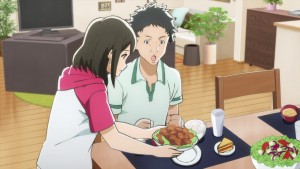 The aftermath of this dark and depressing day gives us a really beautiful scene, as the crestfallen pair lie in bed, wanting to message each other but each ashamed of their own failure. Finally Kotarou sends a simple “I miss you” – and it communicates so much despite saying so little (kind of like Kotarou’s seiyuu Chiba Shouya – someone really needs to do a mix tape of his non-linguistic verbalizations). It’s just a lovely, heartbreaking moment – proof that eloquence is about more than fancy words. The next day Akane and Kotarou recount their painful Sundays to each other, but reiterate their desire to pursue their dreams – not through anything they say to each other, but simply by taking strength from the other’s presence.
The aftermath of this dark and depressing day gives us a really beautiful scene, as the crestfallen pair lie in bed, wanting to message each other but each ashamed of their own failure. Finally Kotarou sends a simple “I miss you” – and it communicates so much despite saying so little (kind of like Kotarou’s seiyuu Chiba Shouya – someone really needs to do a mix tape of his non-linguistic verbalizations). It’s just a lovely, heartbreaking moment – proof that eloquence is about more than fancy words. The next day Akane and Kotarou recount their painful Sundays to each other, but reiterate their desire to pursue their dreams – not through anything they say to each other, but simply by taking strength from the other’s presence.
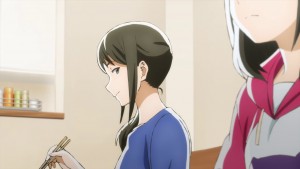 The Chinatsu situation isn’t going away soon. Chinatsu confirms that she knew Akane and Kotarou were going out (I was rather stunned that some viewers doubted it), but later tells Akane she wants to confess to Kotarou to “get closure”. Logically that may not be a bad idea – he’d say no and that (in theory) would be that – but in emotional reality, she’s testing the limits of her friendship with Akane. Meanwhile Kotarou will have to continue to seek solace in his Shrine/bookstore aniki (his dad is sympathetic but more interested in cleaning his guns (!) than standing up to his wife) and try to stay true to himself despite the stifling presence of his mother. One can only imagine how she’d react if she knew Kotarou had a girlfriend – and I could easily see her being the sort of woman who’d snatch her son’s phone and read his messages. No, this romance is not sailing into calm and placid waters – but pinky swears, once given, have truly magical powers…
The Chinatsu situation isn’t going away soon. Chinatsu confirms that she knew Akane and Kotarou were going out (I was rather stunned that some viewers doubted it), but later tells Akane she wants to confess to Kotarou to “get closure”. Logically that may not be a bad idea – he’d say no and that (in theory) would be that – but in emotional reality, she’s testing the limits of her friendship with Akane. Meanwhile Kotarou will have to continue to seek solace in his Shrine/bookstore aniki (his dad is sympathetic but more interested in cleaning his guns (!) than standing up to his wife) and try to stay true to himself despite the stifling presence of his mother. One can only imagine how she’d react if she knew Kotarou had a girlfriend – and I could easily see her being the sort of woman who’d snatch her son’s phone and read his messages. No, this romance is not sailing into calm and placid waters – but pinky swears, once given, have truly magical powers…
Sakuramake:
Gifutomake:
Ryoukomake:
Photomake:


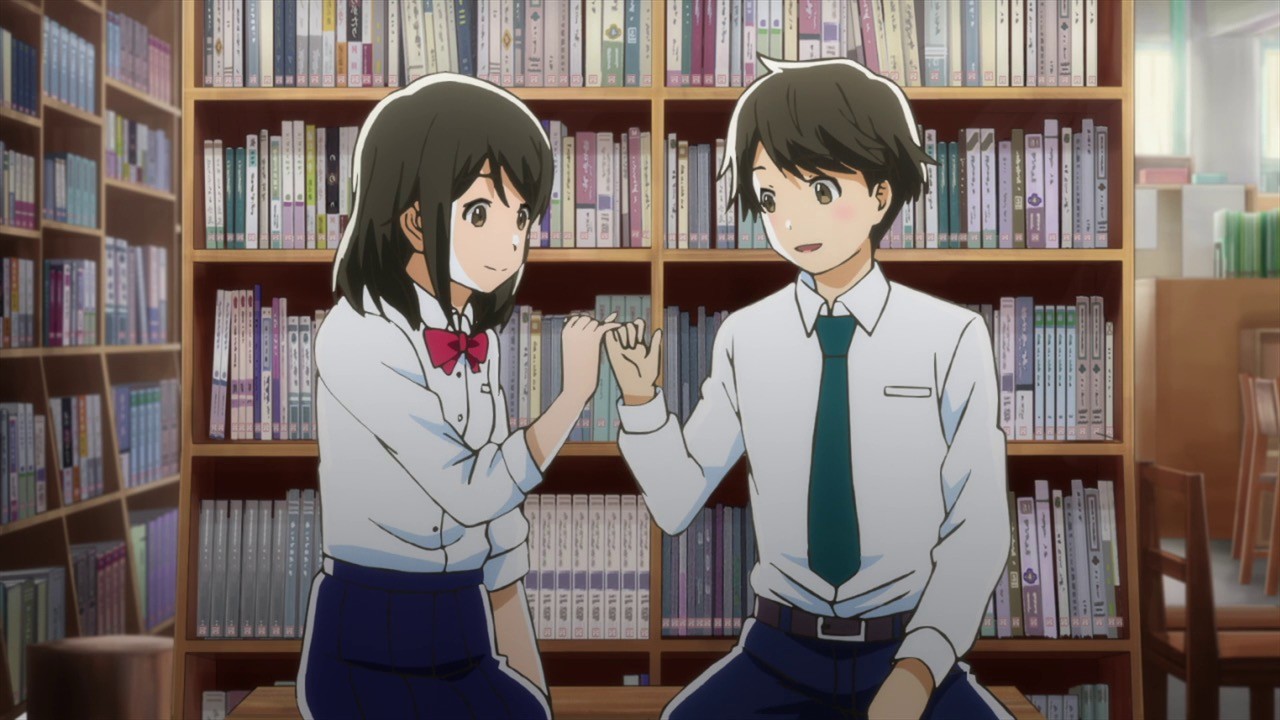
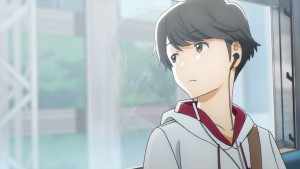
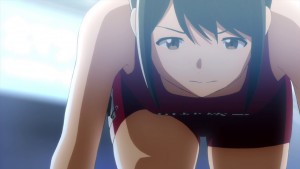
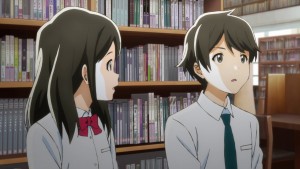
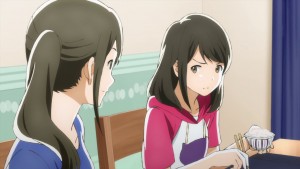
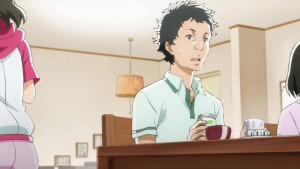
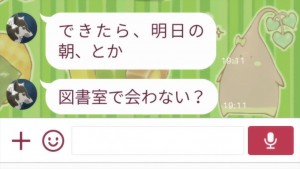


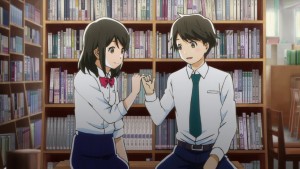
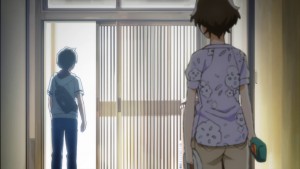

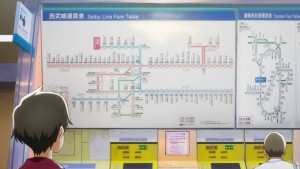
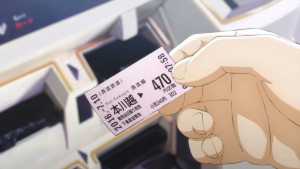
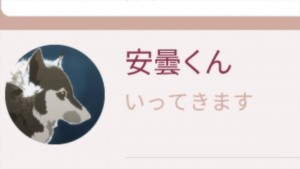
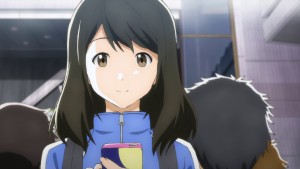
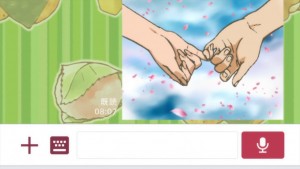

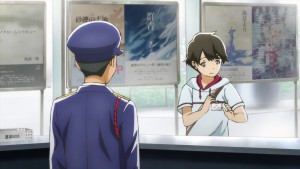
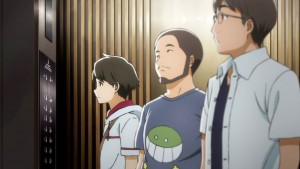
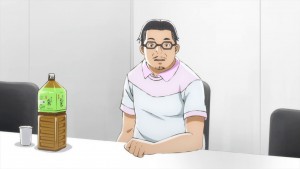
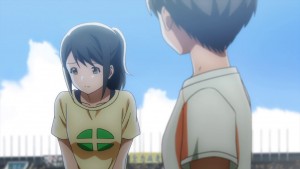
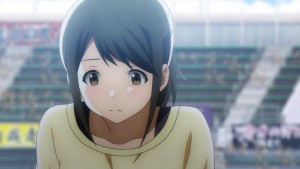
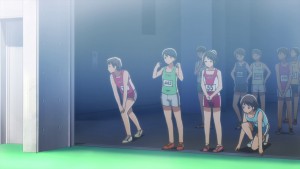
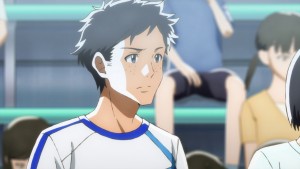
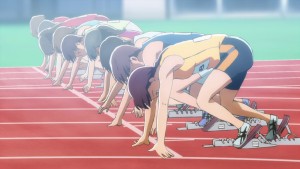
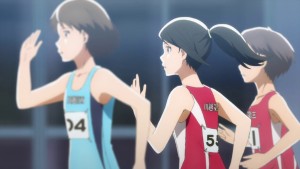
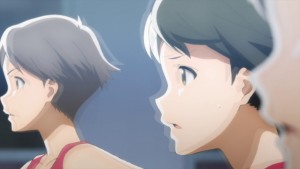
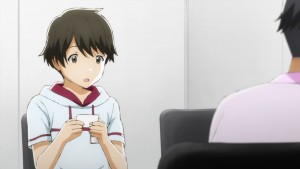
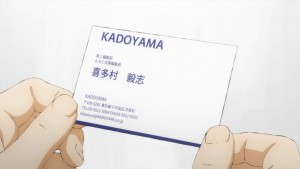
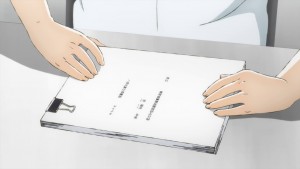
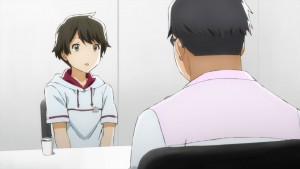
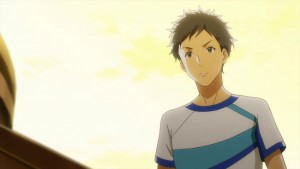
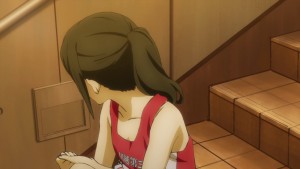
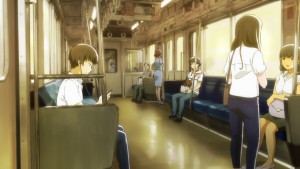
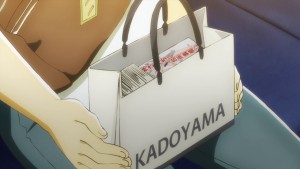

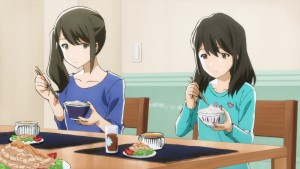
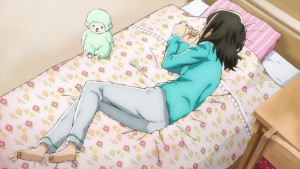
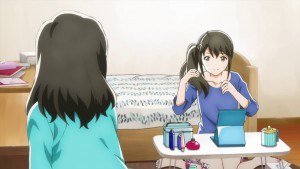
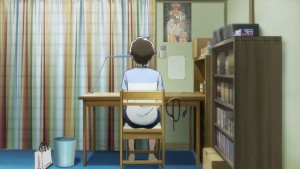
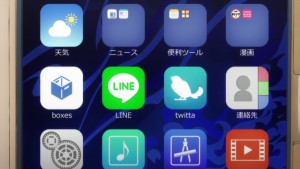
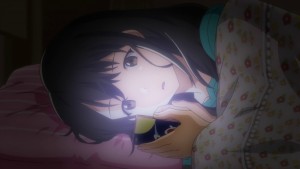
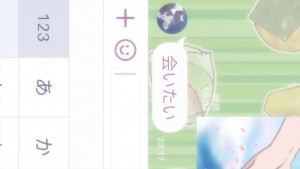
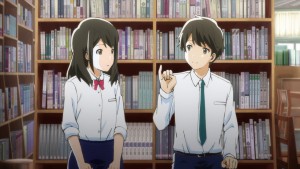
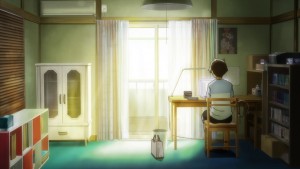
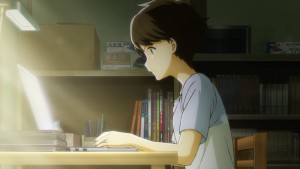
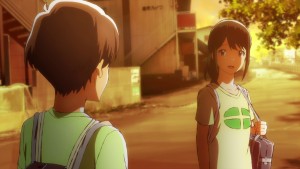
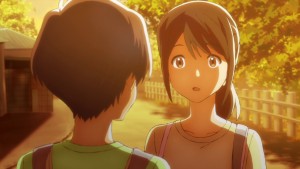
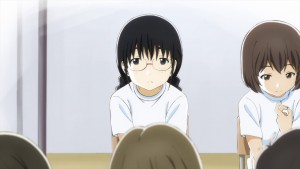



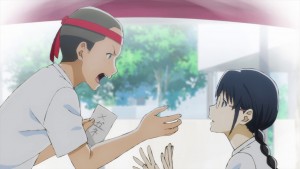
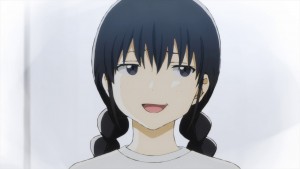
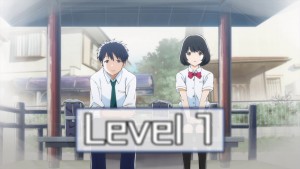
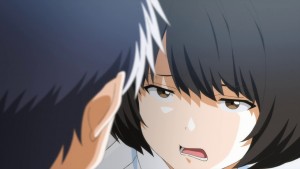
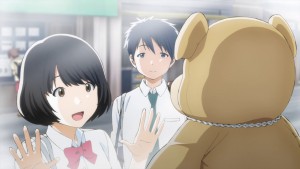
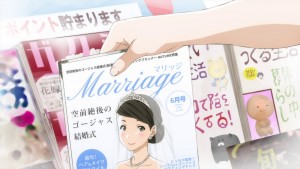
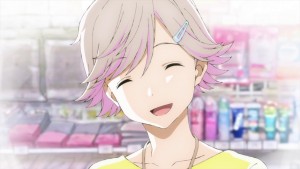
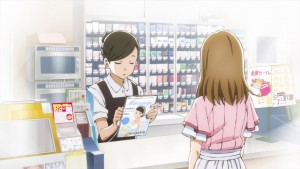
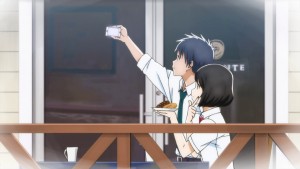
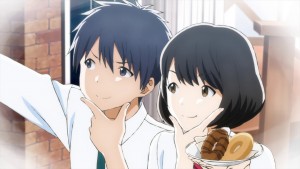
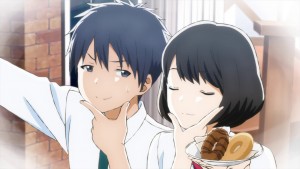
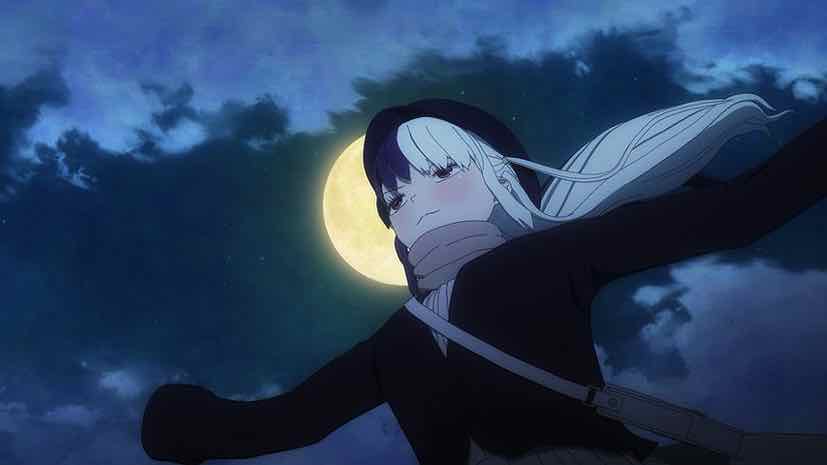
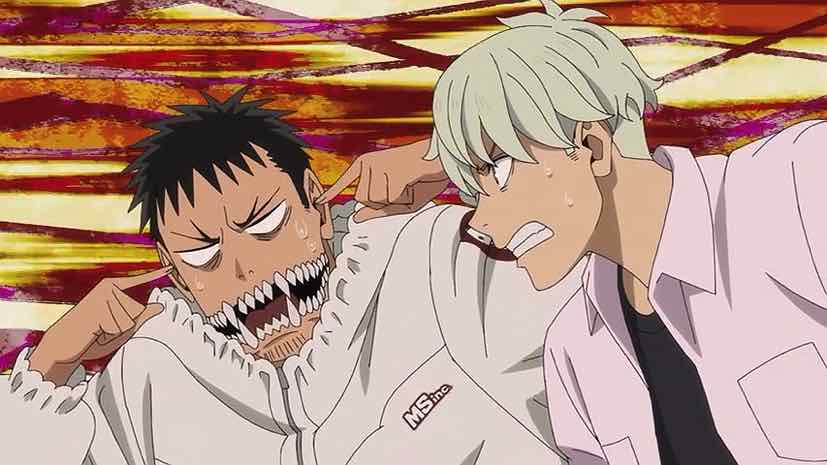
Dop
May 12, 2017 at 2:03 amI did think the whole “You’re not good enough to be a real writer, but hey, you could write light novels” bit was a bit of a dig at the whole ‘light novel’ industry, and that amused me.
You weren’t the only one infuriated when Kotarou’s mother said “no good can come of writing”, that’s for sure.
Zaiden
May 12, 2017 at 7:05 amI can’t quite put my fingers on why Kotarou’s commute by train into central Tokyo stood out to me. But there’s no denying the pride of witnessing Kotarou ascend the steps of adulthood, by making the journey into the city so that he can chase after his dreams. Or maybe it is because of my familiarity with long train journeys, commuting from the suburban fringes of London into the hustling and bustling city centre. Heh, what a nostalgic feeling and I’m starting to miss home quite a bit.
Guardian Enzo
May 12, 2017 at 7:30 amYeah, you know – you can only single out so many good things in an ep this good. I was at 1K words as is. But I loved that train journey too (the second time this show has reminded me of 5CM). Kishi really understands the power of silence, of letting the characters’ faces tell the story.
Matti
May 12, 2017 at 11:55 amYup, fate sealed. Poor dude’s gonna “stick it to the man” by going indie and writing web novels about reincarnation.
Flower
May 12, 2017 at 9:19 pmI really piked the lovely, simple message of “I miss you.” as well … but I was more hit by the train ride sequence … there was something about his riding that train all by himself with all sorts of thoughts whirling about in his head and only confiding the fact to his “first love” who he is seeing in secret in those short, terse messages of his.
And yes … it was finally in that scene that I was reminded of 5 cm.
Kudos to the insert song at that moment too … well done.
ruicarlov
May 14, 2017 at 4:45 pmI admit that I was one that doubted whether Chinatsu really knew about their relationship because her actions are quite hard to predict. Kudos to the show for that. Just when you think it might do one thing, it throws us another curveball that goes against most expectations. I wasn’t expecting both meetings (publishing and athletic) to go that well, but I’ll be lying if Kotarou’s mother and the editor didn’t rustle my jimmies.